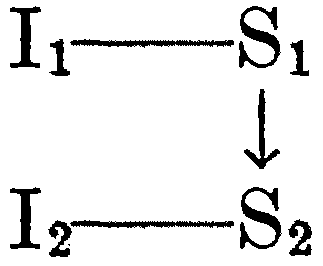REPUBLIC

The constituent power is the sovereign power. The nation possesses the sovereign power.
The Declaration of the Rights of Man and of the Citizen says:
"The principle of any sovereignty resides essentially in the Nation. No body, no individual can exert authority which does not emanate expressly from it." (Text)
State

The state is applied logic based on freedom.
- The constituent power is the power over the content of the pure form ABOVE/BEFORE.
- The legislative power is the power over the content of the pure form BELOW/BEFORE.
- The executive power is the power over the content of the pure form BELOW/AFTER.
- The judicial power is the power over the content of the pure form ABOVE/AFTER.
The state's logic is illustrated by Alf Ross with the figure below. (Figure)

Alf Ross writes:
"Wherever an ordinary norm is applied to a concrete case - such as, for instance, where a judge imposes a punishment on a criminal in accordance with the general norm of the penal code - it is a case of a practical inference of the same type as that of the instance first mentioned." (Text)
Authorization
No one can possess a power without a legal basis rooted in the republic's constitution.
A legal basis is called an authorization.
With an authorization, someone is authorized to possess a power.
Someone who is authorized to possess a power is called an authority.
Authorities

The authorities possess the constituent power, the legislative power, the executive power and the judicial power.
- When an authority possesses the constituent power and makes and/or abolishes the content of the pure form ABOVE/BEFORE, the content of the pure form ABOVE/BEFORE is a judgment with the mundality freedom and the modality above/before.
- When an authority possesses the legislative power and makes and/or abolishes the content of the pure form BELOW/BEFORE, the content of the pure form BELOW/BEFORE is a judgment with the mundality freedom and the modality below/before.
- When an authority possesses the executive power and makes and/or abolishes the content of the pure form BELOW/AFTER, the content of the pure form BELOW/AFTER is a judgment with the mundality freedom and the modality below/after.
- When an authority possesses the judicial power and makes and/or abolishes the content of the pure form ABOVE/AFTER, the content of the pure form ABOVE/AFTER is a judgment with the mundality freedom and the modality above/after.
Nation
The nation is the sovereign authority.
The nation consists of active and passive members.
- Active members have completed the process of formation from rebirth to constituent power and have the republic's nationality.
- Passive members have the same nationality as the active members, but passive members have not completed the process of formation from rebirth to constituent power.
Only the active members of the nation possess the constituent power.
When the active members make and/or abolish the content of the pure form ABOVE/BEFORE, the content of the pure form ABOVE/BEFORE is a judgment with the mundality freedom and the modality above/before.
No one can be an active member of more than a single nation at the same time. Possession of constituent power in another nation requires a change of nationality. Change of nationality is a matter of national sovereignty.
President
The president has an essential and majestic responsibility.
The president is responsible for a constantly updated and complete list of all the active members of the nation.
The presidency can be either hereditary or not hereditary. Whether the presidency is hereditary or not hereditary is a matter of national sovereignty.
